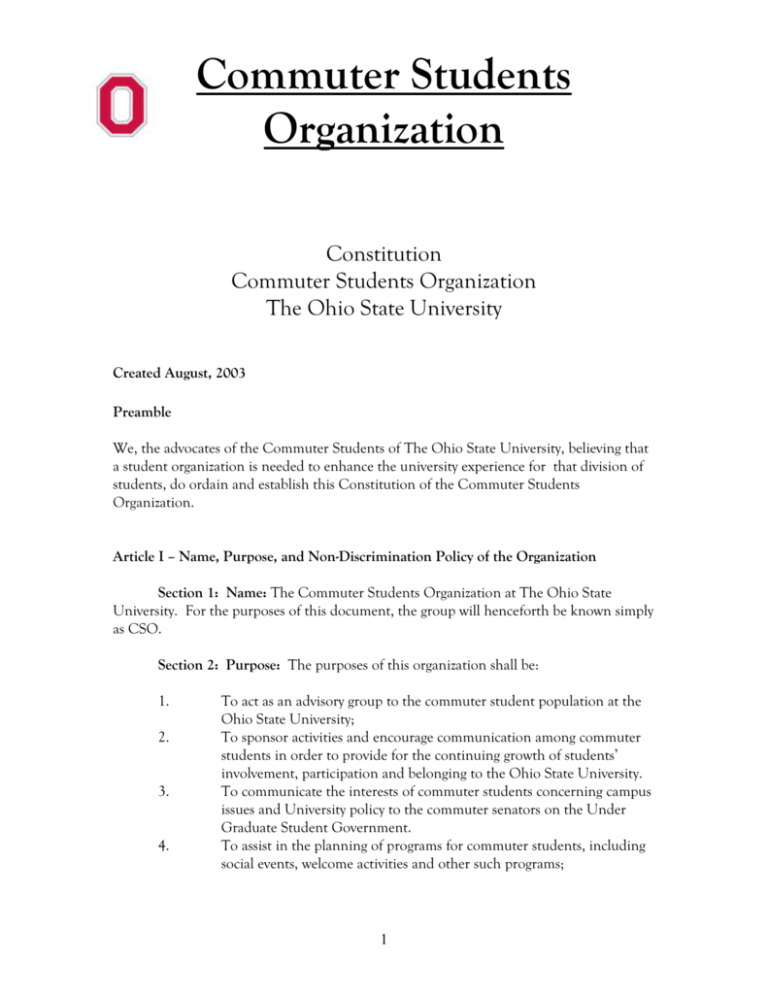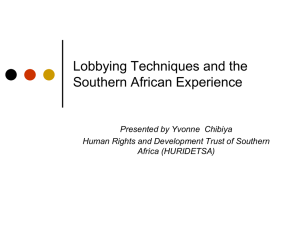The Constitution Of The Humanities Scholars Leadership Council at
advertisement

Commuter Students Organization Constitution Commuter Students Organization The Ohio State University Created August, 2003 Preamble We, the advocates of the Commuter Students of The Ohio State University, believing that a student organization is needed to enhance the university experience for that division of students, do ordain and establish this Constitution of the Commuter Students Organization. Article I – Name, Purpose, and Non-Discrimination Policy of the Organization Section 1: Name: The Commuter Students Organization at The Ohio State University. For the purposes of this document, the group will henceforth be known simply as CSO. Section 2: Purpose: The purposes of this organization shall be: 1. 2. 3. 4. To act as an advisory group to the commuter student population at the Ohio State University; To sponsor activities and encourage communication among commuter students in order to provide for the continuing growth of students’ involvement, participation and belonging to the Ohio State University. To communicate the interests of commuter students concerning campus issues and University policy to the commuter senators on the Under Graduate Student Government. To assist in the planning of programs for commuter students, including social events, welcome activities and other such programs; 1 Commuter Students Organization 5. To create an organization through which commuter students of the Ohio State University can take leadership roles and contribute to the involvement of commuter students to the University community. Section 3: Non-Discrimination Policy: The Commuter Student Organization shall not discriminate against any individual(s) for reasons of race, color, creed, religion, sexual orientation, national origin, sex, age, disability, or veteran status. Article II – Membership: Types of Membership Section 1: Officers: Officers are elected by their peers in the commuter student population by a process to be decided each Spring Quarter. Section 2: Committee Co-Chairpersons: For each committee sanctioned by CSO, one Committee Co-Chairperson will be appointed by a vote of the CSO and one Committee Co-Chairperson will be appointed by the president of CSO. Section 4: Non-Voting Representatives: Non-voting Representatives in CSO are off campus students at Ohio State, who, although not elected as Officers, have decided to attend meetings of the CSO. Non-Voting Representatives may participate in discussion or debate at meetings of the CSO. Article III – Membership: Qualifications for Membership Section 1: Qualifications for Membership: All members of the CSO must be fulltime or part-time students at The Ohio State University, who have at one time commuted to campus or are currently living in off-campus housing. Section 2: Qualifications for Officers and Committee Co-Chairpersons: In addition to the requirements stated in Article III, Section 1 of the Constitution, Officers of the CSO must have completed two full-time quarters (twenty-four credit hours) at The Ohio State University. Article IV: Organization Leadership: Titles, Terms of Office, Selection of Leaders, and Removal of Leaders From Office Section 1: Titles: Within the CSO, there shall be four Officers, a President, a VicePresident, a Treasurer, and a Secretary. There shall also be two committee co-chairpersons. 2 Commuter Students Organization Section 2: Terms of Office: The Officers of the CSO shall have term lengths of approximately one year, beginning two weeks after the tallying of election results; elections are held in April of each year. Section 3: Type of Selection: The Officers shall be chosen by a vote of all members of the CSO program and shall be chosen via an internet ballot. . The election may be conducted via email to the organization’s advisor or on an electronic voting website and shall be so done at the discretion of the organization’s advisor. Section 4: Official Duties of the President: The President of the organization shall be responsible for conducting the organization’s meetings. This function includes calling to and maintaining order during the duration of meetings of the CSO and presenting the agenda for each meeting. The President shall give the introduction to each meeting, introduce the meeting agenda, and conduct any preliminary discussions to voting on new business. If there are to be no votes within the meeting, the President shall conduct all discussion within the meeting. In addition, the President will serve as the official liaison to the faculty advisor of CSO Furthermore, the President will be the official diplomat and dignitary on behalf of the commuter student body at university functions and events that require a representative on the program’s behalf, unless otherwise chosen by the faculty advisor, a vote of the CSO, or by circumstance, such as a special invitation to another member of the commuter student body. Section 5: Official Duties of the Vice-President: The Vice-President of the organization shall first and foremost assume all duties of the President should the President not be able to fulfill them for any reason. In addition, the Vice-President shall be the convenor of the Committee Co-Chairpersons of the organization. This duty shall encompass monitoring the productivity of each committee, evaluating the need for the continuation of each committee, and recommending the termination or creation of committees to the CSO and to the faculty advisor. Furthermore, the Vice-President shall be the Parliamentarian at meetings of the CSO, and thus, will be the official conductor of debates pertaining to proposals to be voted upon and the act of voting itself. Section 6: Official Duties of the Treasurer: The Treasurer of the organization shall be responsible for keeping records of the organization’s finances. The Treasurer, along with the organization’s advisor, will be responsible for signing the organization’s checks in order to make purchases, pay debts, or otherwise exchange funds of the organization. Also, the Treasurer will be responsible for informing all members of the organization of the organization’s financial status. 3 Commuter Students Organization Section 7: Official Duties of the Secretary: The Secretary of the organization shall be responsible for keeping written records of meetings of the CSO. The Secretary shall produce for each meeting, a written minutes to be sent to all members of the CSO, complete with all necessary details of the meeting and information regarding the time and location of the next official meeting. In addition, the Secretary shall also be responsible for making meeting reservations for the CSO, regarding the location and time of the meetings. Section 8: Removal of Leaders From Office: If an Officer or committee chairperson of the CSO fails to perform his or her duties, he or she may be subject to dismissal from office at the hands of the remaining members of the CSO. Any of the remaining Officers organization may make a proposal to dismiss an officer to the rest of the CSO within a meeting, as governed by the normal rules of procedure of the organization. A vote shall be conducted, without the presence of the Officer or committee chairperson in question, and removal shall be granted in this case only if three-fourths of the remaining officers and class representatives agree upon removal. In addition to this method of removal, the faculty advisor may also recommend removal from office for any Officer or committee chairperson, which will be decided via a vote as described above. Furthermore, dismissal from The Ohio State University will immediately end the term of office for an Officer or committee chairperson, without a vote being cast. Article V: Standing Committees & Committee Co-Chairpersons: Section 1: Names of Committees: Upon the inception of this Constitution, the established Standing Committees shall be the computer committee. Section 2: Composition of Committees: Committees shall be comprised of members of the CSO. Only requirements listed in Article III, Section 1 must be met. In addition, Officers of the CSO may participate in committee activities, including serving as Committee Co-Chairpersons. Section 3: Selection of Committee Co-Chairpersons: Henceforth, one Committee Co-Chairperson for each of the committees listed in Section 1 of this article shall be selected by the newly elected Officers shortly following their taking of office during Spring Quarter, and one Committee Co-Chairperson for each of the committees listed in Section 1 or this article shall be selected by the Program Coordinator shortly following the elections during Spring Quarter. Committee Co-Chairpersons shall nominate themselves via an application process. Applications for each Co-Chairperson will be distributed during the same period in which elections for new Officers shall be held during April. The new Officers and the faculty advisor shall then review the applications. The new Officers 4 Commuter Students Organization shall appoint one Committee Co-Chairperson for each committee via a vote. A 3/4 majority vote of the Officers shall be sufficient to accept Committee Co-Chairpersons into their positions. The Program coordinator shall also appoint one Committee CoChairperson for each committee. Section 4: Committee Co-Chairpersons Terms of Position: Committee CoChairpersons terms of position last approximately one year, starting immediately following their selection by the Officers of the organization and the faculty advisor during Spring Quarter until the next selection by Officers of the CSO and the faculty advisor the following year. Committee Co-Chairpersons may apply for positions as Co-Chairpersons as many times as they so choose, but will not necessarily be selected by the Officers of the Organization or by the faculty advisor if they are incumbents. Section 5: Addition of Ad Hoc Committees: Committees may be added to the Commuter Student Organization via a vote of the organization. During Spring Quarter, the Vice-President, acting as head of the Standing Committees, shall review the committees’ actions from the previous academic year, and make recommendations for the addition of a new committee(s) if he or she feels it is necessary. In addition, the faculty advisor may also recommend the addition of a new Standing Committee for the organization to vote upon. If a vote is passed by the organization for the addition of a new Standing Committee, the committee shall become active upon the insertion of the new Committee Co-Chairpersons to their positions following elections of Officers of CSO. Section 6: Official Duties of Committee Co-Chairpersons: Committee CoChairpersons shall be responsible for determining the direction of each Standing Committee during the academic year. Committee Co-Chairpersons shall be responsible for recruiting other commuter students to assist them in their committee’s work, planning events, programs, or activities for the commuter students within their committee’s given area, and reporting their upcoming activities to the CSO during meetings of the organization. Article VI: Advisor(s) to the Organization: Section 1: Number of Advisors: The Assistant Director of Off-Campus Student Services at the Ohio State University will serve as the principal advisor to the organization at all times, and thus, there must always be at least one advisor to CSO. The Program Coordinator may, however, appoint others as secondary advisors to the group if he or she so chooses. 5 Commuter Students Organization Section 2: Qualifications for Secondary Advisors: Secondary Advisors to the organization must be above the undergraduate level of study and must be either enrolled as either graduate or professional students at The Ohio State University or faculty or staff members at The Ohio State University. In addition, the faculty advisor may supplement these requirements at his or her discretion. Section 3: Official Duties of the Advisor: The Advisor(s) are responsible for overseeing the group’s activities and making certain that the organization is staying within the bounds of its Constitution and all of the policies of The Ohio State University. Furthermore, at least one advisor, along with the organization’s Treasurer, is responsible for co-signing each check issued on behalf of the organization. Article VII: Meetings of the Organization: Section 1: Meeting Style: Meetings shall be conducted according to Robert’s Rules of Order. In order to proceed, either the President or the Vice-President, acting as President, must be present. In the event that only the President is present, he or she shall act as both acting President and Vice-President, encompassing all the duties of both roles. The same is true should only the Vice-President be present. The President of the organization shall begin and end each meeting, introduce non-voting topics of discussion, and introduce any guest speakers. The Vice-President, serving as Parliamentarian, shall regulate voting procedure and discussion of issues being voted upon. Section 2: Frequency of Meetings: Meetings of the CSO will be held bi-weekly during the academic year at a regular meeting time to be decided quarterly by the members of the CSO, including all Officers. Section 3: Cancellation of Meetings: Meetings of the CSO may be cancelled via a vote of the organization at the meeting preceding the meeting that has been brought up for cancellation. Only the acting President may bring to vote a measure to cancel a regularly scheduled meeting of the organization. Section 4: Calling of Special Meetings: A special meeting may be called during the academic year by two methods. The faculty advisor of the CSO may call a special meeting of the CSO so long as he or she gives three days notice to members of the organization. The second method must be proposed and voted upon by the organization at a regularly scheduled meeting. Article VIII: Ratification of the Constitution: 6 Commuter Students Organization Section 1: Ratification: The Constitution of the CSO shall be ratified only after approval by the founding Officers, Committee Co-Chairpersons, and Advisor of the organization. Article IX: Method of Amending the Constitution: Section 1: Proposal of Amendments: Proposals for amendments to the Constitution of the Commuter Students Organization shall be made at meetings of the Commuter Students Organization. Anyone in attendance at a meeting may make a proposal for an amendment, but the amendment must be submitted to the President of the Commuter Students Organization at least one week ahead of time in order to be considered. Section 2: Passage of Amendments: Amendments will only be added to the Constitution after a rigorous voting process. First, the CSO must pass the proposed amendment by a 4/5 majority vote as described in Article X of the Constitution. After passage by the organization, the proposed amendment shall be put before the general membership of the program, which then must pass the measure by a 2/3 majority of those who vote on the proposal, as described in Article X. An amendment to the Constitution shall become active immediately upon its passage by the general body of the commuter population. Article X: Method of Election of Officers and Vote Distribution: Section 1: Election of Officers: Officers of the CSO shall be elected by the general membership of the CSO during April of each year. Nominations for office may be made by any member of the Ohio State commuter student population but the proposed nominee must accept the nomination for him- or herself. Nominees must be made known to the Program Coordinator at least two weeks prior to the election. The election shall be conducted via the internet. Votes shall be tallied by the Advisor/Program Coordinator in order to maintain fairness for all candidates. The nominee with the most votes for each Officer position shall be awarded the election. A majority vote of at least 50% is not needed for election, as more than two nominees may run for each office. In the case of a tie, there will be a runoff election between the two top candidates until a winner is declared. Section 2: Distribution of Votes Amongst the Organization: During meetings of the CSO, each Officer in the organization shall have one vote when a proposal is presented to the organization. Non-Voting members of the CSO may participate in discussion of 7 Commuter Students Organization proposals to the organization but will not be permitted voting privileges when a measure is called to question. Article XI: Dissolution of the Organization: Section 1: Method of Dissolution: First and foremost, the organization shall be dissolved should the Ohio State University itself be disbanded. The second method of dissolution may occur via a recommendation of dissolution from the Assistant Director, who may end the organization at any time. The Advisor to the organization, must, however provide to the CSO a written statement detailing the reasons for dissolution. Section 2: Disposing of Assets and Debts Upon Dissolution: Should the organization be dissolved for any reasons, any monetary assets that the group has attained shall be given to The Office for Off-Campus Students at The Ohio State University. Any non-monetary assets shall be distributed at the discretion of the Officers and Advisor of the CSO. Furthermore, it shall be the responsibility of the Treasurer and the Advisor of the organization, whose names appear on the organization’s checks, to deal with any debt that has been incurred by the organization at the time of dissolution. Also, the responsibility of closing any bank accounts in the name of the organization shall fall upon the Treasurer and the Advisor, whose names appear on the checks at the time of dissolution. 8 Commuter Students Organization Constitution The Commuter Students Organization The Ohio State University Signed: _______________________ Jesse LaSalle, President _______________________ Jeremy Lange, Vice President _______________________ Bethany Cunningham Treasurer _______________________ Francesca Gomez Secretary/Communications _______________________ Sean McLaughlin Advisor 9





